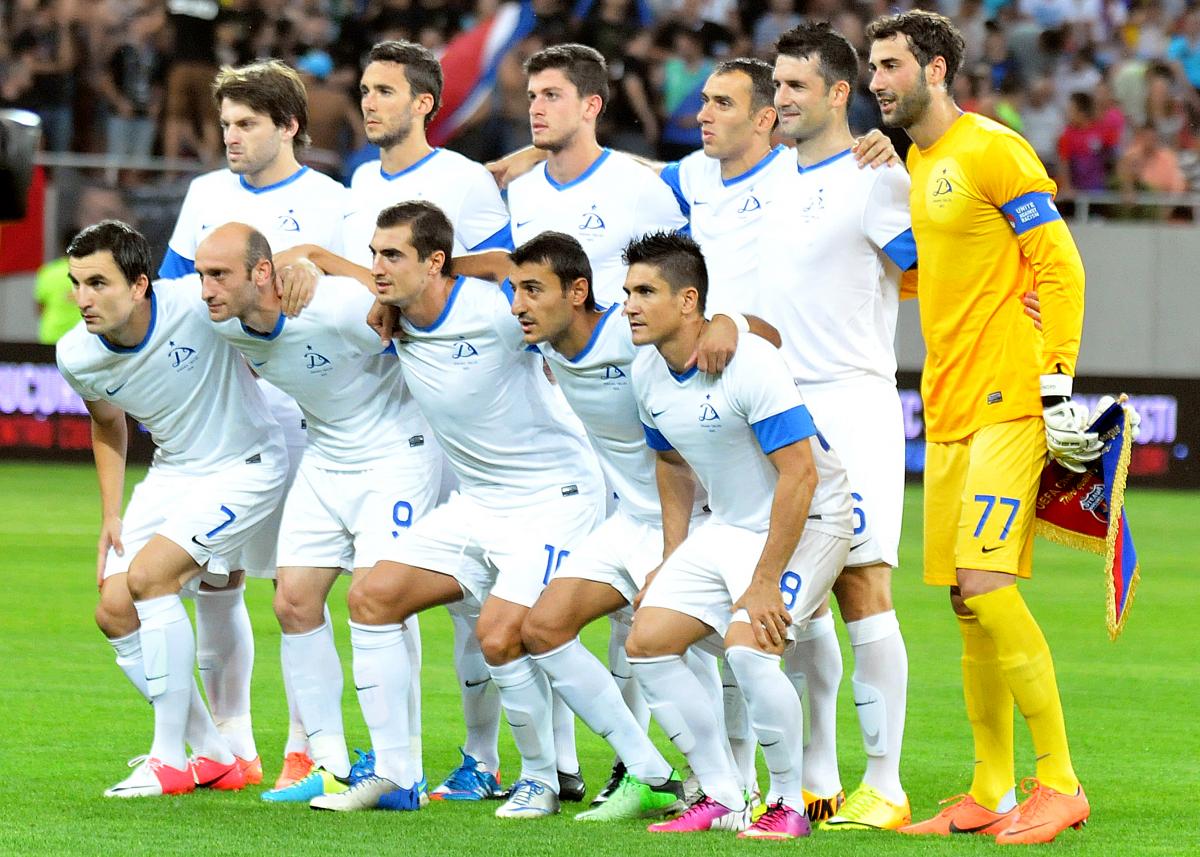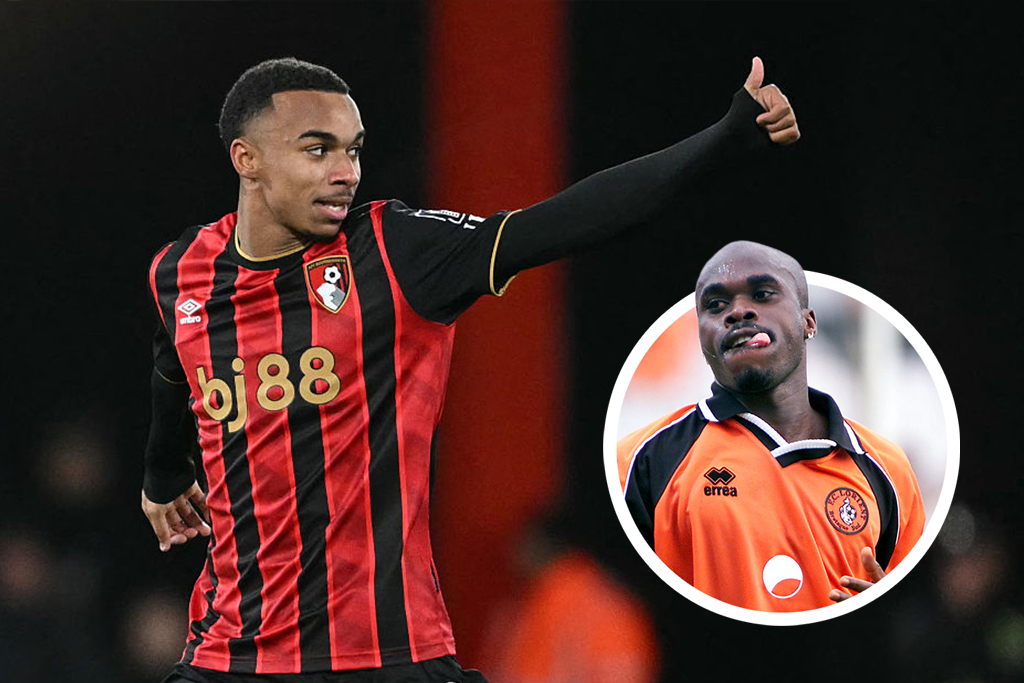Everything you need to know about Dinamo Tbilisi
Mark Gilbey assesses Spurs' Europa League opponents

The best features, fun and footballing quizzes, straight to your inbox every week.
You are now subscribed
Your newsletter sign-up was successful
Want to add more newsletters?

Five times a week
FourFourTwo Daily
Fantastic football content straight to your inbox! From the latest transfer news, quizzes, videos, features and interviews with the biggest names in the game, plus lots more.

Once a week
...And it’s LIVE!
Sign up to our FREE live football newsletter, tracking all of the biggest games available to watch on the device of your choice. Never miss a kick-off!
Join the club
Get full access to premium articles, exclusive features and a growing list of member rewards.
Success runs in the family
It is very much a case of like father, like son at Dinamo Tbilisi. Last summer the Czech coach Dušan Uhrin Jr arrived and promptly delivered a league and cup double – their 14th post-Soviet title – and first since 2008 when his father, Dušan Uhrin Sr (who took the Czech Republic to the final of Euro ’96), was manager. Nobody could dislodge them from top spot after round three and Dinamo eventually finished 10 points ahead of runners-up Dila Gori, scoring 88 times in the process.
This is a 40-year reunion
Tottenham Hotspur have made the 2,200-mile trip to Tbilisi before, when the region was still part of the Soviet Union. Bill Nicholson’s side’s visit behind the Iron Curtain came by way of a 1973 third-round Uefa Cup tie. The first leg in the Georgian capital on 28 November ended in a 1-1 draw after Kakhi Asatiani’s equaliser cancelled out Ralph Coates’ opener, but Spurs thrashed Dinamo at White Hart Lane a fortnight later, winning 5-1. Martin Peters and Martin Chivers both netted braces to add to Chris McGrath’s goal. Zorbeg Ebralidze scored the visitors’ consolation. Spurs reached the final that season (then a two-legged affair), only to lose 4-2 on aggregate to Feyenoord.
http://www.youtube.com/watch?v=sBeXZ5uWPtk
The best features, fun and footballing quizzes, straight to your inbox every week.
This is Roman’s empire
Georgian businessman Roman Pipia purchased the club in 2011 from the family of the late Badri Patarkatsishvili, the country’s wealthiest man once linked with buying West Ham United who died in Britain five years ago. He soon set about reinvigorating the club on and off the field. The club’s training ground was modernised, as was the Dinamo Arena where this evening’s match will be played; Cristiano Ronaldo, Andriy Shevchenko and Kakha Kaladze were even among the guests who attended the opening of Dinamo’s academy last month. The bank VTB, also a sponsor of Dinamo Moscow, is set to invest in the club which may see them receive as much as €10m over the next four years.
…but their transfer dealings prove Dinamo shop in different stores to Spurs
Despite an increased budget, Dinamo are not the new Anzhi Makhachkala. While Spurs have splurged this summer, breaking their transfer record twice and, most likely, a third time with the expected arrival of Willian, Dinamo were unable to keep their influential Spanish midfielder Mikel Álvaro. A key performer in their title-winning season, the 30-year-old was lured over the border into neighbouring Azerbaijan by İnter Bakı. Dinamo’s signings have been decidedly more low-key. Patrick Vouho, a 26-year-old Ivorian striker from Cypriot side AEL Limassol whom André Villas-Boas worked with at Académica, and Romanian forward Dorin Goga arriving following an unhappy spell in Israel, compliment a handful of players picked up from Umaglesi Liga sides.
Xisco has an eye for goal
Despite Álvaro departing there is still a Spanish flavour to this Dinamo side. At the back, is the former Atletico Bilbao defender Ustaritz and up front the 32-year-old attacker Xisco Muñoz, (not to be confused with the former Newcastle United striker) who played in La Liga for the likes of Real Betis, Valencia and Levante. Villas-Boas picked him out in the pre-match press conference. “I want to single out Xisco, who is a really outstanding footballer,” the Portuguese noted. As a guide, the former Spain under-21 international earns about €20,000 a month, although the squad average is around half that amount; there was a rumour before their Champions League qualifier against Steaua that the players were promised a €15,000 bonus if they progressed. The versatile Xisco scored 24 times last season playing off Jaba Dvali (who himself notched 20 league goals) in Uhrin’s preferred 4-4-1-1 formation. Giorgi Merebashvili also played a key role in Dinamo’s double-winning season and the side has Georgian internationals in the likes of Dvali, Irakli Dzaria, Elguja Grigalashvili and Giorgi Loria, but midfielder Levan Khmaladze is suspended and will miss this evening’s game.
Form
Dinamo’s season has only really just begun. They have, though, played more games than Tottenham: two in the league – a 2-1 win at home to Zestafoni and a 1-1 draw at Dila – plus four European qualifiers. Dinamo beat the Faroese side EB/Streymur 9-2 on aggregate in the second qualifying stage of the Champions League, but dropped into the Europa League after losing 3-1 over two legs to Romania’s Steaua Bucharest in the next round. “Mission improbable” was how the local media have described the tie and, while Spurs should progress without too much fuss against a side ranked 234th in Europe, Dinamo will be backed by a sizeable and partisan following.
New era, new badge
Dinamo reintroduced the Cyrillic “D” (Д) from the Dinamo Sports Society last year. The letter also forms a falcon’s head. A symbol of the Georgian capital, legend has it that while out hunting a king’s falcon caught a pheasant and they both fell into a hot spring; it is on that spot that Tbilisi was founded. Part of the thinking behind the new crest was to differentiate them from the other Dinamo clubs across the region. But it sat uneasily among some sections of support, mainly because the Cyrillic “D” symbol has connotations with Russia.
It is eight years since Dinamo last played in the group stages of a European competition
Being the dominate force of post-Soviet Georgian football, Dinamo have been regulars in Europe since independence. But their last appearances in the first round proper/group stages of any competition came during the 2004/05 season. They finished bottom of their Uefa Cup group containing Graeme Souness’ Newcastle United (who beat Dinamo 2-0 at St James’ Park thanks to goals from Alan Shearer and Craig Bellamy), Panionios, Sochaux and Sporting Lisbon without taking so much as a point off any of them.
English clubs were once familiar opposition for Dinamo
This evening will be Dinamo’s 16th match against English opponents, although the majority of those have been friendlies. They first faced West Bromwich Albion in 1957, losing 3-0 to Vic Buckingham’s side. Friendlies three years later against Sheffield Wednesday (a 1-0 victory in Tbilisi and 5-0 reverse at Hillsborough), a 5-2 defeat against Spurs and 5-5 draw with Wolverhampton Wanderers followed, as did a 2-0 win over Aston Villa a year later. After those two games against Spurs, Dinamo lost 1-0 to West Brom in 1977 and two years later came up against Liverpool in the European Cup. Despite losing the first leg 2-1, they shocked Bob Paisley’s side in Tbilisi with a 3-0 victory in front of 110,000 fans. The following season they beat West Ham United 4-2 over two games on their way to winning the European Cup Winners’ Cup, but Dinamo’s next meeting with English opposition would not come until 1989, in a 1-0 friendly defeat to Oldham Athletic. In the post-Soviet era, however, Dinamo have met just Newcastle in the group stages of the Uefa Cup. Dinamo also beat Cardiff City 3-1 on aggregate in the 1976/77 Cup Winners’ Cup, who were competing in Europe after winning the Welsh Cup.
http://www.youtube.com/watch?v=bHEO2d2k5gA
History
Founded in 1925, the club has its roots in the Dinamo Sports Society which was affiliated to the Ministry of the Interior and, along with Dynamo Kyiv and Dinamo Moscow, were ever-present in the Soviet Top League. Twice, in 1964 and 1978, they were champions of the USSR; Dinamo also won the Soviet Cup on two occasions. Their finest hour came in 1981 when Dinamo lifted the European Cup Winners’ Cup by defeating Carl Zeiss Jena 2-1 in Düsseldorf. They dominated Georgian football after independence, claiming 14 Umaglesi Liga titles and winning the country’s cup 10 times. The current crop of Dinamo players are perhaps names not familiar to fans in England, but in recent times Kaladze, Shota Arveladze, Georgi Kinkladze and Temuri Ketsbaia all began their careers with the club.
 Join The Club
Join The Club










